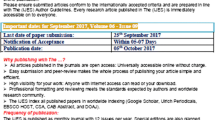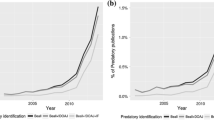Abstract
The current status of academic publishing is worrying. Cybercriminals are now targeting academic audiences, making it necessary to inform both editors and authors about such issues. The latest involves bogus impact factors, which are challenging scholarly publishing. Legitimate impact factors are used by authors and editors to get a general idea of the audience, if any, for a particular piece or journal. The bogus metrics only add confusion in support of the cybercrimes of their initiators. In this paper, we discuss bogus impact factors, victim countries, and try to clarify the phenomena for both authors and editors.


Similar content being viewed by others
References
Beall J. Criteria for determining predatory open-access publishers. Scholarly open access. 2015. https://scholarlyoa.files.wordpress.com/2015/01/criteria-2015. Pdf. Accessed 14 Feb 2015.
Beall J. Misleading metrics. 2016. https://scholarlyoa.com/other-pages/misleading-metrics/. Accessed 7 July 2016.
Dadkhah M, Bianciardi G. Ranking Predatory Journals: Solve the Problem Instead of Removing It! Adv Pharm Bull. 2016;6(1):1–4.
Gutierrez FR, Beall J, Forero DA. Spurious alternative impact factors: the scale of the problem from an academic perspective. BioEssays. 2015;37(5):474–6.
Jalalian M, Mahboobi H. New corruption detected: bogus impact factors compiled by fake organizations. Electron Phys. 2013;5(3):6856–86.
Jalalian M. The story of fake impact factor companies and how we detected them. Electron Phys. 2015;7(2):1069–72.
Memon AR. ResearchGate is no longer reliable: leniency towards ghost journals may decrease its impact on the scientific community. J Pak Med Assoc. 2016;66(12):1643–7.
Nolfi DA, Lockhart JS, Myers CR. Predatory publishing: what you don’t know can hurt you. Nurse Educ. 2015;40(5):217–9.
Author information
Authors and Affiliations
Corresponding author
Additional information
Authors note Our goal is to increase the quality of academic publishing, helping journals to improve themselves. We do not want to challenge legitimate academic journals, scientific databases, or scientific social networks. Our data may change due to updating of the related databases (such as Alexa), advanced techniques used by cybercriminals, and those who would expose them.
Rights and permissions
About this article
Cite this article
Dadkhah, M., Borchardt, G., Lagzian, M. et al. Academic Journals Plagued by Bogus Impact Factors. Pub Res Q 33, 183–187 (2017). https://doi.org/10.1007/s12109-017-9509-4
Published:
Issue Date:
DOI: https://doi.org/10.1007/s12109-017-9509-4




